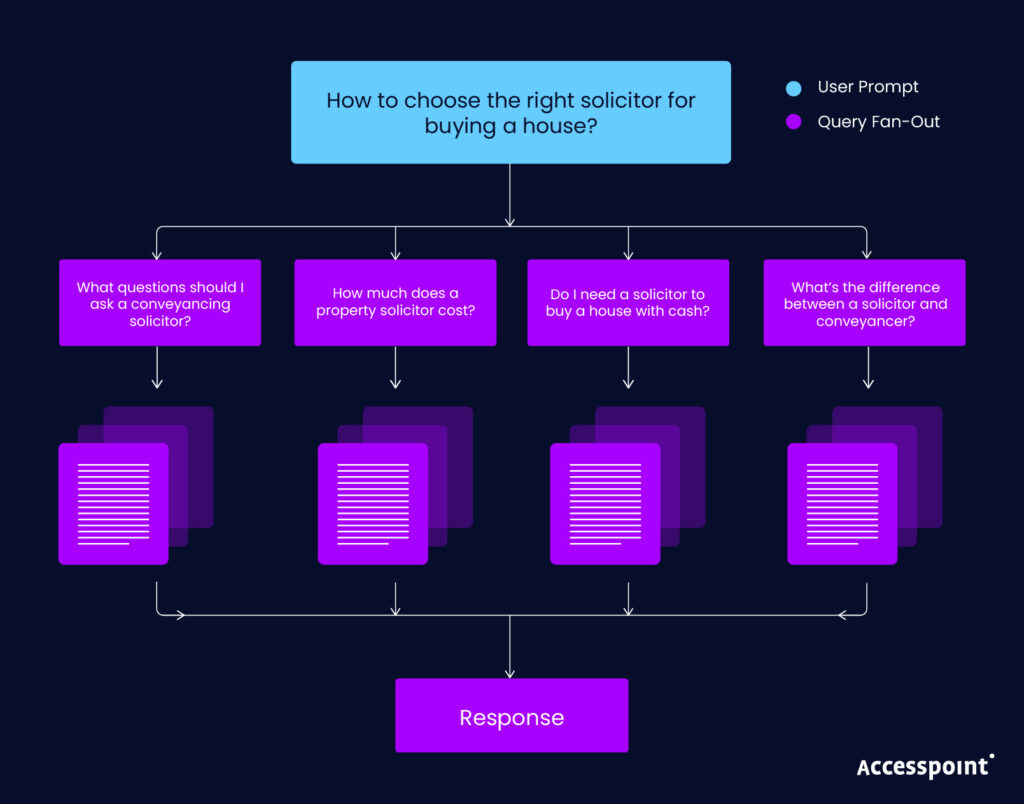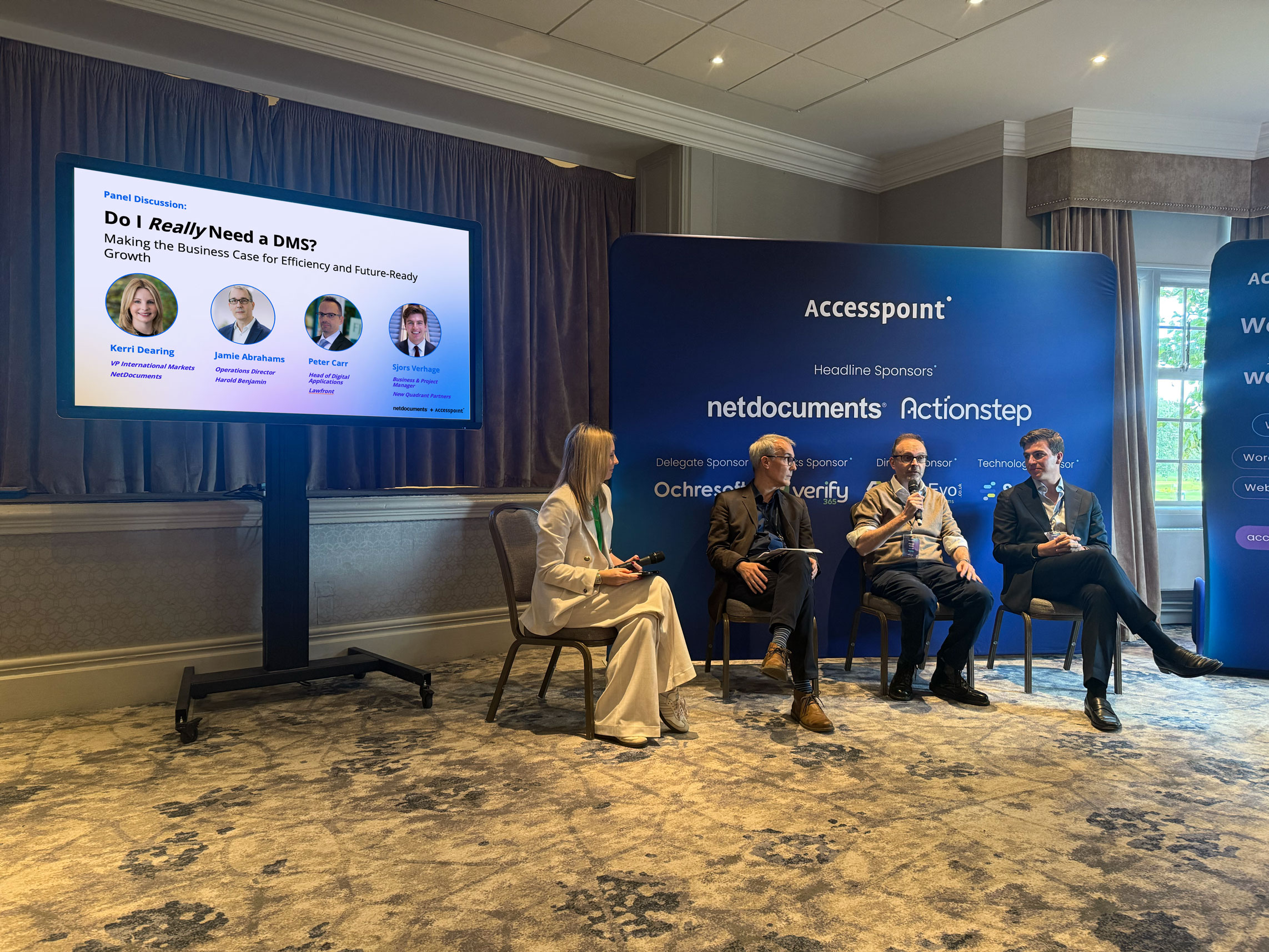Overview
If you’ve ever written a blog post, news article, or service page and wondered why it doesn’t attract as much traffic as you hoped, you’re not alone. The problem often isn’t your writing, it’s often how niche and narrow your article might be, especially when it comes to Law Firm SEO or other specialist content. That’s where a simple idea called “Query Fan-Out” comes in.
Don’t worry, this isn’t another bit of SEO jargon. “Query Fan-Out” is just a practical way of making sure your article covers everything people might search for around a topic, not just one phrase which is a crucial skill for effective Law Firm Search Engine Optimisation. When you use this approach, you can reach a wider audience without stuffing your page full of keywords.
Now is the time to level up your law firm SEO. Let’s break it down step by step.
What does “Query Fan-Out” mean?
In plain English, “Query Fan-Out” means branching out from one main search query into several related ones.
For example, if your main idea is “how do I change a tyre?”, people might also search for:
- “how long does it take to change a tyre?”
- “can I change a tyre without tools?”
- “how much does it cost to change a tyre?”
- “how do I change tyre safely at home?”
All those searches are variations of the same theme. If your article includes short, clear sections that touch on each of them, it’s more likely to appear in search results for all of them, not just one. That’s “fan-out” in action.

Why does Query Fan-Out matter for your content?
Search engines like Google try to match pages with what people actually want to know. That’s particularly important in Law Firm SEO, where clients search for legal advice and services in many different ways. If your article only answers one narrow question, it might miss out on dozens of similar searches.
By using a fan-out approach:
- You cover more ground without repeating yourself. For Law Firm Search Engine Optimisation, this approach means reaching potential clients searching different legal terms.
- You make your content more useful for readers.
- You increase your visibility for a variety of search terms.
It’s not about guessing what people might type into Google. It’s about thinking more broadly about how your audience might ask the same question in different ways, or what question they might ask next.
Step-by-step guide on how to apply “Query Fan-Out” to your next article
Here’s how to do it, even if you’ve never touched an SEO tool in your life.
Step 1: Start with your main topic
Write down the main idea you’re covering. For example:
“How to choose the right solicitor for buying a house.”
That’s your core query. The starting point for your fan-out, and it’s a great starting point for Law Firm SEO content.
Step 2: Think about what else people might ask
Imagine you’re the reader. What other questions might you type into Google when researching that same topic?
You might come up with things like:
- “What questions should I ask a conveyancing solicitor?”
- “How much does a property solicitor cost?”
- “Do I need a solicitor to buy a house with cash?”
- “What’s the difference between a solicitor and conveyancer?”
Each of these is a branch of your main query.
Step 3: Use free, simple tools to find real examples
You don’t need fancy software to expand your fan-out. Here are a few easy ways to discover related queries:
- Google’s “People Also Ask” boxes – Type your topic into Google and note the questions that appear in this box.
- Related searches at the bottom of Google results – These are real searches people make.
- Autocomplete suggestions – Start typing your phrase into Google and look at what pops up.
- AnswerThePublic (free version) – Type your keyword and see a visual web of related questions.
Jot down 5–10 variations that feel most relevant to your audience. These tools are particularly helpful for planning Law Firm Search Engine Optimisation content, where phrasing can vary widely.
Step 4: Group your ideas into sections
Don’t try to cram every query into one long block of text. Instead, use headings to group related questions.
For example, your article could look like this:
- How do I Choose the Right Solicitor for Buying a House?
- What Questions Should I Ask Before Hiring a Solicitor?
- How Much Does a Property Solicitor Cost?
- Do I Need a Solicitor for a Cash Purchase?
- Conveyancer vs. Solicitor – What’s the Difference?
This approach makes your writing easier to read and it helps search engines understand what your page is about and it boosts your Law Firm SEO by helping search engines clearly understand each topic’s intent.
Step 5: Answer each question briefly and clearly
Each section doesn’t have to be long. A few clear sentences or a short paragraph per question is enough. The key is to answer the query directly, using plain language.
For instance, for the question “Conveyancer vs. Solicitor – What’s the Difference?” the succinct answer might be:
“A conveyancer handles property transactions, while a solicitor can offer a wider range of legal services. For straightforward purchases, a conveyancer is usually fine, but if your sale involves complex legal issues, a solicitor may be better.”
That’s one neat paragraph that answers a specific search query. Job done.
Step 6: Add natural variations of your main keyword
When writing, it’s fine to use natural variations of your key phrase like “property lawyer,” “conveyancing solicitor,” or “legal advice for homebuyers.”
This isn’t keyword stuffing. It’s just using the same idea in different ways, so your content matches how people really search. This principle is the same in Law Firm SEO, where using natural variations like ‘family lawyer’, ‘divorce solicitor’, or ‘legal advice for clients’ improves reach.
Step 7: Review your “fan-out” coverage
Before publishing, skim through your article and ask yourself:
- Have I covered a range of related questions?
- Does each section clearly answer something a reader might search for in Google?
- Have I avoided repeating myself or overusing one phrase?
If the answer is yes, you’ve successfully created a piece of content that fans out naturally and all without needing to be an SEO expert.

Pillar and Cluster content for SEO: What it is and why it matters
Whether you’re a legal professional, small business owner, or marketing manager, understanding and implementing this model can have a transformative impact on your organic traffic. Find out how to build E-E-A-T through Pillar and Cluster content by reading Rich‘s recent blog.
Law Firm SEO and Query Fan-Out – Key takeaways
You don’t need to be an SEO professional to benefit from Query Fan-Out. All it takes is curiosity about your audience’s questions.
Remember:
- Start with one main topic.
- Brainstorm related questions.
- Use Google suggestions for inspiration.
- Organise your content into helpful sections.
- Write simple, clear answers.
By following these steps, you’ll naturally create articles that rank for more searches, attract more readers, and feel more useful and all without diving into SEO jargon.
In short: Query Fan-Out is just smart, thoughtful writing that recognises your readers have more than one question. The broader (yet focused) your answers, the wider your reach.
When it makes sense to bring in an SEO specialist
If you’re writing legal content, this is where professional support in Law Firm Search Engine Optimisation can make a measurable difference. While Query Fan-Out is something you can do yourself, there are real benefits to recruiting an SEO professional, especially if you want to take your content to the next level.
Here’s what an SEO specialist can add:
- Data-driven insights: They can identify exactly which queries have the most search volume and which ones your competitors rank for, saving you the guesswork.
- Content strategy planning: An SEO professional can help you map out a content plan that ensures each page complements the others, improving your site’s overall authority.
- Technical optimisation: Beyond writing, SEO includes technical tasks like improving page speed, using structured data, and optimising meta tags. These are things that directly affect rankings but aren’t obvious to most writers.
- Monitoring and adaptation: SEO isn’t a one-time job. Specialists track performance, tweak content, and ensure your articles continue to reach new readers over time.
- Maximising ROI: By combining your expertise with their SEO knowledge, you get articles that are both useful to readers and highly discoverable online.
In short, learning basic strategies like Query Fan-Out can help you write better content today, but pairing your efforts with an SEO expert ensures your work reaches its full potential. When applied consistently, Law Firm SEO strategies like Query Fan-Out can transform visibility and client engagement online.

Contact Rich today – Our Law Firm SEO Expert
If you want to chat about anything in this blog or you want to discuss your law firm SEO and how Accesspoint can help, then email me today. And don’t forget to check out our client case studies below!








